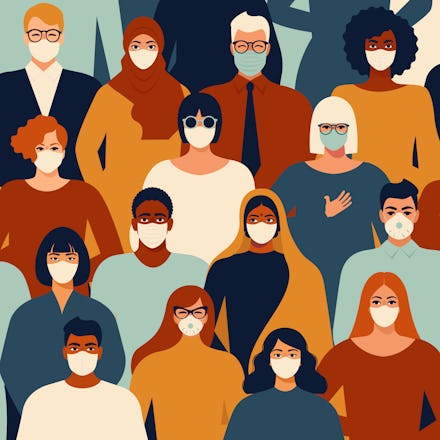China's economy just shrunk for the first time in decades. Could the U.S. be next?

Predicting the coronavirus pandemic's total impact in the United States, let alone across the globe, is difficult. However, new data shows China's economy shrunk for the first time in decades, and it should be taken as a warning. The United States, which has the most recorded coronavirus cases and deaths, could see a similar trend.
On Friday, China's National Bureau of Statistics announced that the country's economy shrank by 6.8% in the first quarter of 2020. The constriction marks a dubious moment in Chinese history: It's the first time the country's economy has shrunk in the first three months of the year since 1992, when China began recording progress quarterly. The Wall Street Journal further notes that it's "likely the first" such downturn "since Mao Zedong’s death in 1976."
The economy's contraction is a result of China's efforts to contain coronavirus by limiting movement and halting business operations, so on some level, the change was expected. In February, Alicia Garcia Herrero, chief economist for Asia Pacific at Natixis, described China's extension of factory and business shutdowns as a "major blast to the global value chain", CNBC reported.
"It was already known that there would be a sharp contraction in the first quarter, so the point is what recovery will there be from the April-June quarter," Masaaki Kanno, chief economist at Sony Financial Holdings in Tokyo, told Reuters. "Japan and the United States are likely to have large negative gross domestic product figures in April-June, so if China will recover, I think it will become a source of hope to the world economy."
The coronavirus pandemic is not quite at its peak in the United States, but its economic impacts are already reverberating. Both small businesses and migrant workers were hit this week. On Thursday, the Small Business Administration's rescue loan program hit its $349 billion limit, and the White House is working with the Department of Agriculture to possibly cut migrant farmworkers' wages.
So far, about 22 million people have lost their jobs, which is roughly equivalent to the cumulative workforce of 23 states, according to The New York Times's Peter Baker. Job losses have translated to a surge in unemployment claims and delays in many states.
In addition to releasing economic data, officials in Wuhan, China, the origin of the coronavirus outbreak, revised the city's coronavirus death count Friday. The new numbers saw the city's death toll jump up by 50% to a total of 3,869 deaths and 50,333 recorded cases. The scaled-up numbers show just how difficult coronavirus mortality is to track in the moment; many of the new deaths came from people who died at home of the virus.
While some have accused China of purposefully underreporting its deaths, the reality is that the U.S. is likely doing so too. If you want to compare any city in the U.S. to Wuhan, the American epicenter is New York City, where there are over 123,000 cases and nearly 12,000 deaths.
But that's just what's been recorded. In early April, Gothamist reported that a surge of New York City residents dying in their homes — at a rate of 200 per day, compared to 20 to 25 before the pandemic — suggests the city is undercounting coronavirus deaths. One official even acknowledged as much.
"There's no doubt we're undercounting," City Councilman Mark Levine, who chairs the city's health committee, told Gothamist. "If the person had a confirmed test result before death then they were marked that was the cause of death on the death certificate. If someone did not have a confirmed test but it appears they had the symptoms, then [the city medical examiner] will flag them as a ‘possible’ [coronavirus death]. It’s unclear to me whether those are being counted in our total stats.”
There's also the matter that a lack of available testing likely means there's a dramatic undercount of coronavirus diagnoses. Either way, it's clear that the pandemic will leave a number of scars. From job losses to concerns that many could lose their housing once eviction moratoriums are up, the economic impacts have been well discussed.
But coronavirus's impact will stretch beyond the economy. There are nearly 35,000 confirmed coronavirus deaths in the United States. The pandemic will impact family structures, the mental health of survivors, and indeed everyday life in general long after it is considered "over."